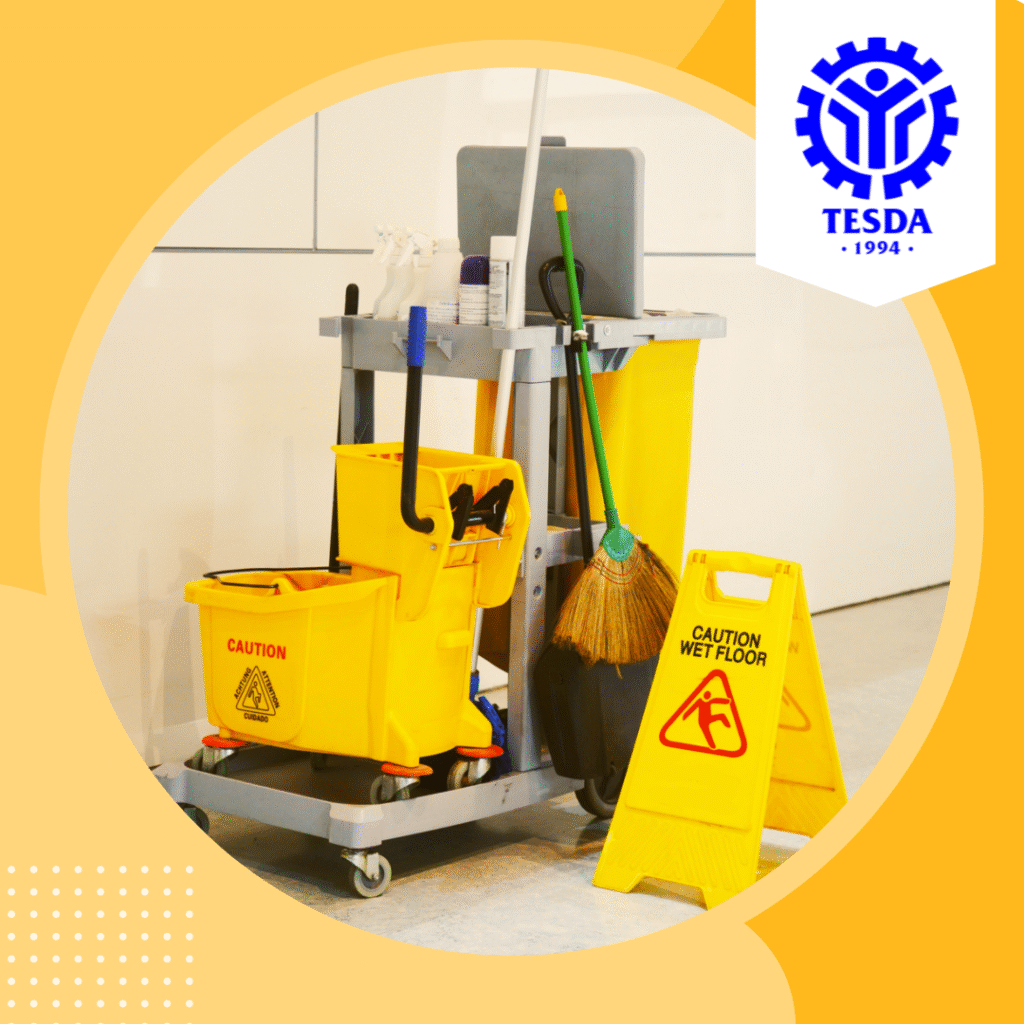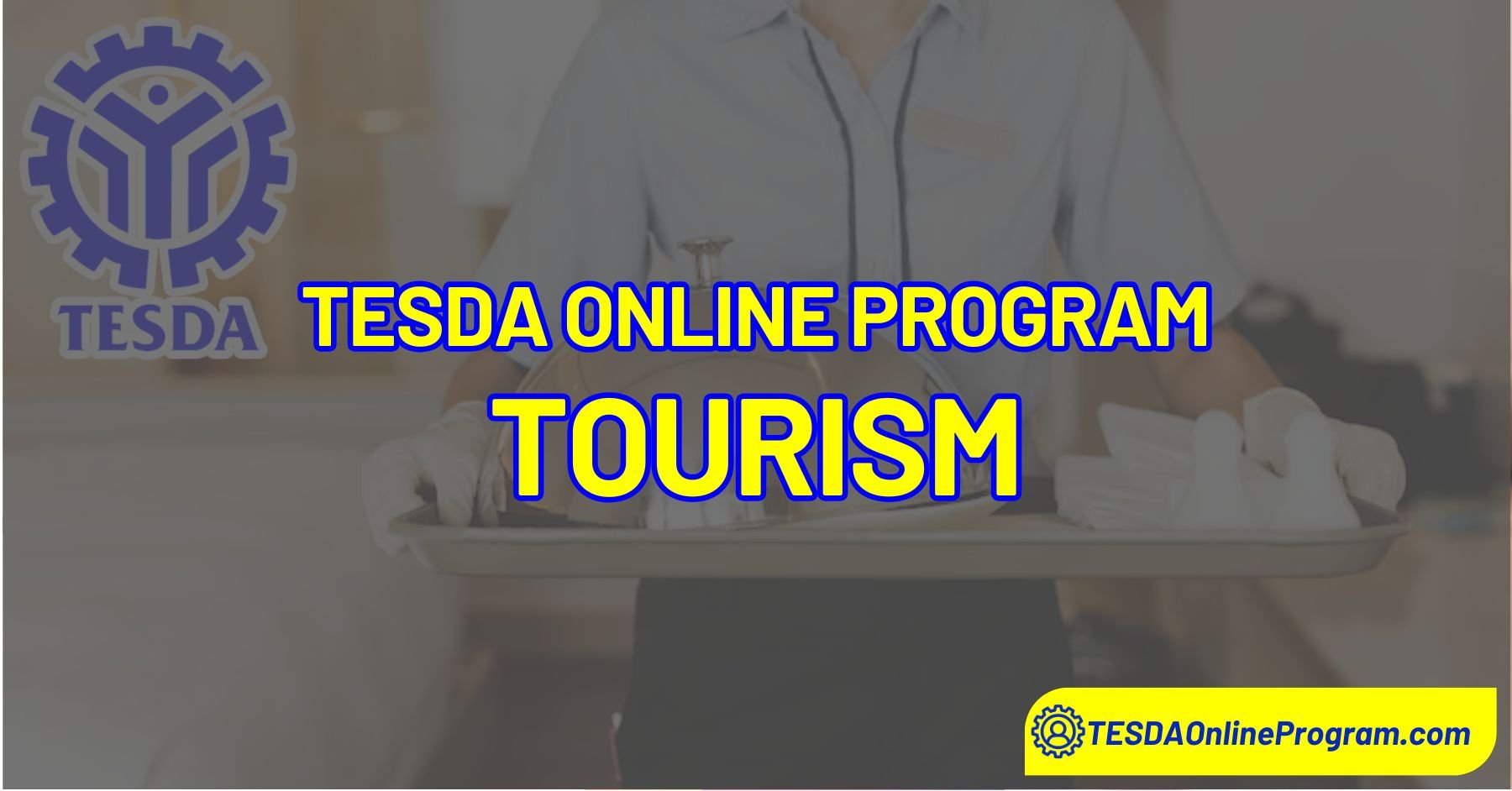The TESDA Online Program (TOP) offers a variety of tourism-related courses designed to help individuals enhance their skills and pursue careers in the hospitality industry. These free online courses provide flexible learning opportunities, making it easier for anyone to gain knowledge and certifications at their own pace. Whether you’re interested in baking, cooking, or managing front office operations, TESDA has the right course for you.
Also read: TESDA Human Health/ Health Care Online Courses
Among the available programs are Bread and Pastry Production NC II, which includes lessons on preparing cakes, Cookery NC II, and Food and Beverage Services NC II. Additionally, learners can explore Front Office Services NC II and Housekeeping NC II, equipping them with the skills needed for a successful career in the tourism sector. These courses are perfect for those looking to upgrade their expertise or start fresh in a growing industry.

Benefits
Here are some of the benefits of taking the Tourism Online Courses:
- Gain industry-recognized certifications to boost your career in tourism and hospitality.
- Learn at your own pace with flexible online courses.
- Develop practical skills in cooking, baking, housekeeping, and customer service.
- Save on costs by accessing free training through the TESDA Online Program.
- Open doors to employment opportunities locally and internationally.
Bread and Pastry Production NC II – Preparing Cakes
Bread and Pastry Production NC II – Preparing Cakes focuses on the skills and knowledge needed to create, fill, decorate, and present various specialty cakes and sponges with high-quality finishes. This self-paced course is part of the competencies in Bread and Pastry Production NC II.

Modules
There are 4 modules included in the “Preparing Cakes” online course:
Unit 1: Getting Ready for Work
Lesson 1: Introduction to Cake Making
Lesson 2: Occupational Safety and Hygiene
Lesson 3: Tools and Equipment Maintenance
Lesson 4: Setting up your Workstation
Unit 2: Understanding the Principles of Baking
Lesson 1: Formulas and Measurements
Lesson 2: The Baking Process
Lesson 3: The Production Process
Unit 3: Preparing and Baking Sponges and Cakes
Lesson 1: Baking Sponges and Cakes
Unit 4: Preparing Fillings, Coatings, Icing and Decoration
Lesson 1: Preparing Fillings and Coatings
Lesson 2: Preparing Icing and Decoration
Lesson 3: Presenting and Storing Cakes, gateaux and tortes
These modules provide a comprehensive understanding of cake making, covering safety, hygiene, baking processes, and techniques for fillings, coatings, icing, and decoration.
Cookery NC II
In today’s fast-paced world, the demand for skilled cooks and chefs is growing as more people rely on food service establishments for convenient meals. The Cookery course by TESDA equips individuals with the skills and knowledge to prepare a wide variety of dishes, focusing on cooking techniques, meal planning, kitchen sanitation, and safety protocols. For added flexibility, the Cookery NC II course is also available online through the TESDA Online Program, allowing students to learn at their own pace. Whether through traditional classes or online learning, this program prepares students for success in the culinary industry.

Modules
In this course, 8 modules make up the Cookery NC II certification. Each module is designed to provide a comprehensive understanding of different aspects of cookery, including food preparation, cooking techniques, and kitchen hygiene.
Module 1: Fundamentals of Professional Cookery
This module is a prerequisite for hands-on food preparation, providing essential knowledge and skills for working in the kitchen.

UNIT 1: Introduction to Professional Cookery
- Lesson 1: The Kitchen Department
- Lesson 2: The Kitchen Staff
By the end of this unit, the learner must be able to:
- Identify the organizational structure inside the kitchen
- Distinguish the importance of the roles of the kitchen staff
- Enumerate several duties and responsibilities of the kitchen staff
- Identify professional work habits observed in the kitchen
UNIT 2: Basics of Professional Cookery
- Lesson 1: Common Kitchen Tools, Utensils, and Equipment
- Lesson 2: Measurements and Conversions
- Lesson 3: Food Safety
- Lesson 4: Occupational Health and Safety Procedure
- Lesson 5: Knife Skills
By the end of this unit, the learner must be able to:
- Identify common kitchen tools, utensils, and equipment in the kitchen
- Convert kitchen measurements
- Practice food and occupational safety procedures
- Demonstrate basic knife skills and
- Define basic and foreign culinary terms commonly used in the kitchen.
Module 2: Preparing Stocks, Sauces, and Soup
This module covers the steps involved in preparing and storing stocks, sauces, and soups, along with providing standard recipes.

Unit 1: Preparing Stocks
- Lesson 1: Introduction to Stocks
- Lesson 2: Preparing Stocks
- Lesson 3: Straining and Storing Stocks
By the end of this unit, the learner must be able to:
- Identify the common ingredients used in preparing stocks
- Identify the characteristics of good quality stocks
- Demonstrate the basic procedure of producing stocks appropriate to the stock type, and
- Demonstrate the correct method for straining and storing stocks
Unit 2: Preparing Sauces
- Lesson 1: Introduction to Sauces
- Lesson 2: Preparing and Storing Sauces
By the end of this unit, the learner must be able to:
- Identify the common ingredients used in preparing sauces
- Identify the difference between mother sauces and derivative sauces
- Demonstrate the basic procedure of preparing a mother sauce, and
- Explain the process of emulsification.
Unit 3: Preparing Soups
- Lesson 1: Introduction to Soups
- Lesson 2: Preparing and Storing Soups
By the end of this unit, the learner must be able to:
- Identify the common ingredients used in preparing soup
- Identify the different classifications of soups
- Demonstrate the basic procedure of preparing a consommé, and
- Demonstrate the basic procedure of preparing a purée.
Module 3: Preparing Egg, Vegetable and Farinaceous Dishes
This module aims to provide you with the necessary knowledge and skills to master the fundamental techniques of cooking eggs. Additionally, it will introduce you to the essential procedures for preparing vegetable and starch-based dishes.

UNIT 1: Preparing Egg Dishes
- Lesson 1: Introduction to Egg Dishes
- Lesson 2: Cooking Egg Dishes
By the end of this unit, the learner must be able to:
- Identify the components of an egg
- Determine the desirable qualities of eggs
- Handle and store fresh eggs properly
- Prepare eggs using various cooking methods
UNIT 2: Preparing Vegetable Dishes
- Lesson 1: Introduction to Vegetables
- Lesson 2: Preparing Vegetables for Cooking
- Lesson 3: Cooking and Plating Vegetables
By the end of this unit, the learner must be able to:
- Determine the types and characteristics of vegetables
- Identify the qualities of vegetables
- Prepare vegetable dishes
- Perform procedures for controlling changes in the quality of vegetables
UNIT 3: Preparing Farinaceous Dishes
- Lesson 1: Introduction to Farinaceous Products
- Lesson 2: Preparing Potato Dishes
- Lesson 3: Preparing Rice Dishes
- Lesson 4: Preparing Pasta Dishes
By the end of this unit, the learner must be able to:
- Identify the different farinaceous products
- Handle and store farinaceous products safely
- Prepare the following farinaceous products using various cooking techniques
Module 4: Preparing Seafood Dishes
This module will provide you with the essential knowledge and skills required to confidently prepare and cook a variety of delicious fish and shellfish dishes.

Unit 1: Introduction to Seafood
- Lesson 1: Introduction to Fish
By the end of this unit, the learner must be able to:
- Identify the different parts of a fish
- Determine the types of fish
- Identify the types of shellfish
Unit 2: Seafood Fabrication
- Lesson 1: Handling Seafood Safely
- Lesson 2: Preparing Fish for Cooking
- Lesson 3: Preparing Shellfish for Cooking
- Lesson 4: Cooking Seafood Dishes
- Lesson 5: Plating Seafood Dishes
By the end of this unit, the learner must be able to:
- Perform and observe measures for the safe handling of seafood
- Demonstrate proper procedures for preparing fish and shellfish for cooking
- Use different cooking methods in preparing seafood dishes
Module 5: Preparing Poultry and Game Dishes
This module will provide you with the necessary knowledge and skills to successfully prepare and cook various types of poultry, including chicken, turkey, duck, and quail, as well as furred and feathered game animals.

UNIT 1: Introduction to Poultry and Game Meats
- Lesson 1: Introduction to Poultry Meat
- Lesson 2: Introduction to Game Meats
By the end of this unit, the learner must be able to:
- Determine the characteristics and differences between different types of poultry meat
- Identify the common and other sources of poultry meat
- Determine the classification and uses of game meats
UNIT 2: Poultry and Game Meat Fabrication
- Lesson 1: Cuts of Poultry Meat
- Lesson 2: Handling Poultry and Game Meat Safely
- Lesson 3: Preparing Poultry and Game Meats for Cooking
- Lesson 4: Cooking Poultry and Game Dishes
- Lesson 5: Plating Poultry and Game Dishes
By the end of this unit, the learner must be able to:
- Identify the primal and sub-primal cuts of poultry meat
- Handle poultry and game meat safely
- Perform basic techniques for preparing poultry and game meat.
Module 6: Preparing Meat Dishes
This module will cover the necessary knowledge and skills for cooking beef, pork, and lamb. The preparation of meat from other sources, such as fowl and game animals, will be discussed in a separate module.

UNIT 1: Introduction to Meat
- Lesson 1: Identifying the Composition and Structure of Meat
- Lesson 2: Determining the Types and Characteristics of Meat
By the end of this unit, the learner must be able to:
- Identify the composition and structure of meat
- Determine the desirable qualities of meat
- Identify the quality grade of different types of meat
UNIT 2: Meat Fabrication
- Lesson 1: Determining the Primal and Subprimal Cuts of Meat
- Lesson 2: Handling Meat Safely
- Lesson 3: Preparing Meat for Cooking
- Lesson 4: Cooking Meat Dishes
- Lesson 5: Plating Meat Dishes
By the end of this unit, the learner must be able to:
- Perform proper procedures for handling meat
- Determine the primal and sub-primal cuts of meat
- Demonstrate the basic techniques for preparing meat.
Module 7: Preparing Sandwiches
The module focuses on the skills and knowledge needed to effectively prepare and present salads and dressings. It is a self-paced component of the Cookery NC II cluster, specifically designed for those interested in preparing cold meals. This module provides comprehensive guidance on the proper procedures for preparing salads and dressings, ensuring that readers gain the necessary expertise.

UNIT 1: Introduction to Sandwiches
- Lesson 1: Identifying the Components of Sandwiches
- Lesson 2: Common Sandwich Preparation Tools and Equipment
- Lesson 3: Observing Kitchen Safety and Sanitation Measures
By the end of this unit, the learner must be able to:
- Define what is a sandwich
- Determine the types of sandwiches and the components of a sandwich
- Identify the common tool and equipment used in preparing sandwiches
- Perform and apply the basic techniques in preparing sandwiches
UNIT 2: Preparing and Plating Sandwiches
- Lesson 1: Basic Sandwich Preparation Techniques
- Lesson 2: Preparing Sandwiches
- Lesson 3: Plating and Holding Sandwiches
By the end of this unit, the learner must be able to:
- Prepare a variety of sandwich types
- Plate the different types of sandwiches
- Perform the proper procedures for holding sandwiches.
Module 8: Preparing Salads and Salad Dressings
Preparing Salads and Dressings module focuses on the necessary skills to prepare and present salads and dressings. This self-paced module is part of the larger Cookery NC II: Preparing Cold Meals cluster. Throughout this module, you will acquire the knowledge and skills required to effectively prepare salads and dressings.

UNIT 1: Introduction to Salads and Salad Dressings
- Lesson 1: Types and Components of Salads
- Lesson 2: Observing Kitchen Safety and Sanitation Measures
By the end of this unit, the learner must be able to:
- Define salads and dressings
- Determine the components of a salad
- Identify common salad ingredients
- Observe personal sanitation and safety measures in the kitchen
- Handle salad ingredients properly and safely.
UNIT 2: Preparing and Plating Salads and Salad Dressings
- Lesson 1: Preparing Salad Dressings
- Lesson 2: Preparing Salads
- Lesson 3: Plating and Storing Salads and Salad Dressings
By the end of this unit, the learner must be able to:
- Prepare salad dressings made of oil and vinegar, mayonnaise and cream
- Prepare different types and variations of salads
- Observe the guidelines for plating salads.
Module 10: Preparing Appetizers and Hors d’oeuvres
The competency of preparing and presenting appetizers and hors d’oeuvres is covered in this module. It is a self-paced module that is part of the Cookery NC II cluster: Preparing Cold Meals. In this module, you will be presented with the knowledge and skills required to perform the procedures for preparing appetizers and hors d’oeuvres correctly.

UNIT 1: Introduction to Appetizers and Hors d’oeuvres
- Lesson 1: Types of Appetizers and Hors d’oeuvres
- Lesson 2: Observing Kitchen Safety and Sanitation Measures
By the end of this unit, the learner must be able to:
- Identify the different types of appetizers and hors d’oeuvres
- Determine the quality of ingredients for preparing appetizers and hors d’oeuvres
- Handle appetizer and hors d’oeuvres ingredients safely
- Perform personal safety procedures in the kitchen.
UNIT 2: Preparing and Plating Appetizers and Hors d’oeuvres
- Lesson 1: Preparing Common Types of Appetizers and Hors d’oeuvres
- Lesson 2: Plating Appetizers and Hors d’oeuvres
By the end of this unit, the learner must be able to:
- Prepare common types of appetizers properly
- Plate and serve common appetizer dishes according to standards
Module 11: Preparing Desserts
This module is designed to equip you with the necessary knowledge and skills for preparing various types of desserts. It will cover a wide range of techniques, ingredients, and equipment needed for creating delicious and aesthetically pleasing desserts that will satisfy any sweet tooth. You will also learn how to properly plate and present your desserts, as well as storage and preservation techniques to ensure their longevity.

UNIT 1: Introduction to Desserts
- Lesson 1: Common Dessert Ingredients
- Lesson 2: Tools and Equipment Used in Preparing Desserts
By the end of this unit, the learner must be able to:
- Identify the common ingredients used in preparing desserts
- Determine the different functions of the common ingredients in preparing desserts
- Identify and properly use the common tools and equipment used in preparing desserts
- Observe the kitchen safety and sanitation measures in preparing desserts.
UNIT 2: Preparing and Plating Desserts
- Lesson 1: Basic Dessert Preparation Techniques
- Lesson 2: Preparing Common Desserts
- Lesson 3: Plating and Storing Desserts
By the end of this unit, the learner must be able to:
- Perform the basic dessert preparation techniques
- Apply the basic preparation techniques in preparing dessert items
- Present dessert items appropriately
Note: Upon completion of each module, or specific modules, you will be awarded a certificate to recognize your achievements and demonstrate your expertise in the respective subject matter. These certificates serve as a testament to your dedication and commitment to continuous learning.
Food and Beverage Services NC II
The Food and Beverage Services NC II Online Course, offered through the TESDA Online Program, provides the essential skills for a career in the food and beverage industry. Whether you’re aiming to work in restaurants, hotels, or other hospitality venues, this course offers comprehensive training. With modules on table service, room service, and F&B operations, you’ll learn to create great dining experiences, ensure guest satisfaction, and handle key responsibilities.

Modules
This course consists of 3 modules, which are designed to equip the students with the necessary knowledge and skills in Food and Beverage Services.
Module 1: Introduction to Food and Beverage Services
The Introduction to Food and Beverage (F&B) Service course provides an overview of the duties and responsibilities of F&B service staff, the role of the F&B department in the tourism industry, and techniques for preparing the F&B environment and addressing guest complaints.

Unit 1: The Food and Beverage Service Department
Lesson 1: The Food and Beverage Service Department
Lesson 2: The Food and Beverage Service Staff
Lesson 3: 5S of Good Housekeeping
By the end of this unit, the learner must be able to:
- Discuss the importance of the food and beverage service industry to the tourism sector.
- Identify the duties and responsibilities of a food and beverage service staff.
- Practice the professional skills required for a food and beverage service staff.
- Observe personal safety practices.
- Observe the 5S of good housekeeping.
Unit 2: Preparing the Environment for Food and Beverage Service
Lesson 1: Checking the Requirements of the Upcoming Service Session
Lesson 2: Setting Up the Dining Area
Lesson 3: Processing Incoming Reservations
By the end of this unit, the learner must be able to:
- Observe the necessary steps/checks in preparing for the upcoming service session
- Identify the different types of menu
- Perform the following procedures in preparing the food and beverage service environment:
- Setting tables
- Dressing tables
- Napkin folding techniques
- Perform the proper procedure for making table reservation
Unit 3: Receiving and Resolving Guest Complaints
Lesson 1: Dealing with Guest Complaints
By the end of this unit, the learner must be able to:
- Deal with complaints from the guests.
- Determine the proper course of action to take when there are guest complaints.
Unit 4: Performing End of Shift Activities
Lesson 1: Replenishing and Requisitioning Items
Lesson 2: Providing Handover
By the end of this unit, the learner must be able to:
- Perform the activities involved in the inventory checking as well as in re-ordering and storing items
- Undertake the steps in providing handover.
Module 2: Providing Room Service
Room service is a convenient feature offered by various establishments, such as hotels, resorts, serviced apartments, and residential clubs. It allows guests to enjoy food and beverage service in the comfort and privacy of their own room or suite. Providing Room Service offers lessons on the knowledge and skills necessary for efficient and effective in-room dining. The types of room service can vary, ranging from 24-hour availability to breakfast-only options.

Unit 1: Taking and Preparing Room Service Orders
Lesson 1: What is a Room Service Attendant
Lesson 2: Taking and Processing Room Service Orders
Lesson 3: Preparing the Tray and Trolley for Room Service
By the end of this unit, the learner must be able to:
- Identify the duties and responsibilities of a room service attendant
- Demonstrate the proper procedure for taking room service orders
- Perform necessary measures in the effective delivery of room service
Unit 2: Delivering the Order
Lesson 1: Transporting the Order
Lesson 2: Serving the Order
Lesson 3: Clearing Room Service Items
By the end of this unit, the learner must be able to:
- Carry out the procedures for transporting room service orders
- Deliver and serve room service orders properly
- Observe the steps in presenting the bill
- Undertake the steps in clearing out room service orders.
Module 3: Providing Table Service
Providing Table Service is a comprehensive course that explores the duties and responsibilities of waitstaff or food and beverage service attendants. From greeting guests to taking orders, serving, ensuring satisfaction, presenting accounts, and preparing for future service, this course covers all aspects of providing exceptional table service.

Unit 1: Introduction to Table Service
Lesson 1: What is a Waitstaff
By the end of this unit, the learner must be able to:
- Identify what a waitstaff is as well as his/her duties and responsibilities.
Unit 2: Meeting and Greeting Guests
Lesson 1: Welcoming Guests
Lesson 2: Seating Guests
Lesson 3: Presenting the Menu
By the end of this unit, the learner must be able to:
- Perform the proper procedure for welcoming guests
- Carry out the steps in seating guests
- Present the menu and offer service advice
Unit 3: Taking Food and Beverage Orders
Lesson 1: Taking Orders
By the end of this unit, the learner must be able to:
- Perform the proper procedure for taking food orders
- Identify the modes of taking orders and the technology involved
- Carry out suggestive selling and upselling strategy
Unit 4: Serving the Orders
Lesson 1: Serving Dishes
Lesson 2: Styles of Service
Lesson 3: Serving Beverages
Lesson 4: Ensuring Guests Satisfaction
By the end of this unit, the learner must be able to:
- Observe the guidelines for providing the different service styles
- Perform the proper procedures in serving food and beverage orders properly
- Determine the benefits and observe the guidelines for ensuring guest satisfaction
Unit 5: Presenting the Bill
Lesson 1: Presenting the Bill and Processing Payments
By the end of this unit, the learner must be able to:
- Process payments and receipts
- Identify cash and non-cash transactions
Unit 6: Concluding the Food Service
Lesson 1: Providing End-of-Service Promotion and Bidding Goodbye
Lesson 2: Clearing Tables
Lesson 3: Cleaning Soiled Tableware
By the end of this unit, the learner must be able to:
- Conclude food service properly
- Express gratitude and bid guests goodbye appropriately.
Unit 7: Closing the Restaurant Area
Lesson 1: Cleaning the Service Area for the Next Service Period
By the end of this unit, the learner must be able to:
- Observe the proper way of cleaning the restaurant area
- Undertake common measures in closing the restaurant
Note: After completing each module, or specific modules, you will receive a certificate to recognize your achievements and expertise in the subject matter. These certificates demonstrate your dedication and commitment to continuous learning.
Front Office Services NC II
The hospitality industry demands top-notch service starting from a guest’s first contact. TESDA offers Front Office Services NC II course equips individuals with skills for reservations, check-ins, and check-outs in commercial accommodations. Whether in hotels, resorts, or guest services, this course prepares you to deliver excellent service and leave a lasting impression.

Modules
The Front Office Services NC II online course consists of 2 modules that aim to equip you with the skills and knowledge required for front office tasks. This course covers various aspects of front-office operations, including customer service, communication, and basic accounting.
Module 1: Introduction to Front Office Services
The Introduction to Front Office (FO) Services course provides a comprehensive overview of the duties, responsibilities, and job descriptions of front office staff. It also covers the specifications, design, and equipment used in the front office department.

Unit 1: The Front Office Department
Lesson 1: The Front Office Department
Lesson 2: The Front Office Staff
Lesson 3: Front Office Design and Equipment
Lesson 4: Performing Clerical Procedures
By the end of this unit, the learner must be able to:
- Identify the tasks and roles performed by the staff of the FO department
- Describe FO work shifts and scheduling practices
- Enumerate traits and qualities that an FO staff should possess
- Identify supporting equipment of the FO department
- Perform clerical procedures.
Unit 2: Dealing with Customers
Lesson 1: The Guest Cycle
Lesson 2: Promoting Products and Services to Guests
Lesson 3: Handling Customers’ Complaints
By the end of this unit, the learner must be able to:
- Explain the guest cycle
- Promote Products and Services to Guests
- Identify how to handle guest complaints
Module 2: Providing Front Office Services
Before proceeding, you must first obtain a Certificate of Completion for the module “Introduction to Front Office Services”. This prerequisite module will provide you with the knowledge and skills to understand the duties and responsibilities of the front office department. This module covers topics such as guest reservation processing, accommodation and concierge services, night auditing, front office financial activities, and club reception services.

Unit 1: Handling Reservation Request
Lesson 1: Receiving and Processing Reservation Request
Lesson 2: Operating a Computerized Reservation System
By the end of this unit, the learner must be able to:
- Identify the different types of reservations, services, forms and modes of payment.
- Perform the steps in receiving and processing reservations.
- Identify how to record details of the reservation.
- Describe the process of updating reservations.
- Identify the types of reservation systems.
- Identify the types of computer management software.
- Perform the method of operating a computerized reservation system.
- Enumerate the steps in registering the guests.
Unit 2: Providing Accommodation, Reception, Club Reception and Concierge Services
Lesson 1: Providing Accommodation Reception Services
Lesson 2: Providing Club Reception Services
Lesson 3: Providing Concierge and Bell Services
By the end of this unit, the learner must be able to:
- Identify the steps in preparing a reception area for guest arrival.
- Perform during stay function.
- Familiarize yourself with the different front office forms.
- Identify the steps in providing club reception services.
- Identify the steps in providing concierge and bell services.
Unit 3: Evaluating Front Office Financial Activities
Lesson 1: Conducting Night Audit
Lesson 2: Providing Cashiering Services
By the end of this unit, the learner must be able to:
- Identify the steps in conducting a night audit.
- Enumerate the methods in preparing guest folio.
- Explain the steps in collecting cash, cash equivalents or non-cash transactions.
- Describe the appropriate method for processing receipts and payments.
- Identify the steps in reconciling financial transactions at the end of the shift.
Note: Upon completion of each module, or specific modules, you will be awarded a certificate to acknowledge your accomplishments and expertise in the respective subject. These certificates serve as tangible proof of your unwavering dedication and commitment to lifelong learning.
Housekeeping NC II
The Housekeeping NC II Online Course by TESDA Online Program (TOP) equips learners with key skills for the hospitality industry, covering guest room preparation, public area cleaning, valet services, and laundry. It offers an in-depth understanding of accommodation services, preparing students to tackle real-world challenges in their careers.

Modules
This course is composed of 6 modules that cover the basic and advanced skills in housekeeping. Each module is essential for students to understand the different tasks involved in housekeeping.
Module 1: Providing Housekeeping Services to Guests
This course covers housekeeping services for guests in the tourism industry, including duties and responsibilities of various positions in the Housekeeping department.

Unit 1: Getting Ready for Work
- Lesson 1: The Housekeeping Department
- Lesson 2: The Housekeeping Staff
Upon completion of this unit, you will possess the necessary skills to:
- Differentiate the different types of accommodation
- Identify the parts of a basic accommodation organizational chart
- Describe the different duties and responsibilities of different Housekeeping staff
Unit 2: Handling Housekeeping Requests
- Lesson 1: Accepting Housekeeping Requests
- Lesson 2: Recording Housekeeping Requests
- Lesson 3: Advising Guests on the Delivery of Identified Item/ Service
- Lesson 4: Provide Housekeeping Requests
- Lesson 5: Provide Advice to Guests
- Lesson 6: Liaise with other departments
Upon completion of this unit, you will possess the necessary skills to:
- Apply appropriate procedures in:
- Accepting housekeeping requests
- Recording housekeeping requests
- Advising on time for delivery of service or items
- Providing housekeeping requests
- Providing advice to guests
- Liaising with other departments
Module 2: Deal with Intoxicated Guest

Unit 1: Understanding Alcohol Service Management
- Lesson 1: Duty of Care to Guests and Staff
- Lesson 2: Understanding Alcoholic Drinks
- Lesson 3: Intoxication
Upon completion of this unit, you will possess the necessary skills to:
- Identify the responsibilities and obligations of housekeeping staff to guests
- Discover the benefits of responsible service of alcohol
- Apply appropriate procedures according to organizational policies
- Recognize what alcohol is and its types
- Recognize the effects of alcohol
- Identify what intoxication is and how alcohol affects the brain
- Recognize the signs of intoxication
Unit 2: Handling Intoxicated Guest
- Lesson 1: Determining Level of Intoxication
- Lesson 2: Applying Appropriate Procedure
- Lesson 3: Dealing with Difficult Situations
Upon completion of this unit, you will possess the necessary skills to:
- Distinguish an intoxicated guest from a non – intoxicated guest
- Apply appropriate procedures in handling intoxicated guest
Unit 3: Compliance with Legislation
- Lesson 1: Dealing with Underage Drinkers
Upon completion of this unit, you will possess the necessary skills to:
- Comply with Legislative requirements in serving alcohol
- Identify ways of preventing underage drinking
Module 3: Providing Guest Room Services

Unit 1: Getting Ready for Work
- Lesson 1: What is a Guest Room Attendant?
- Lesson 2: Good Grooming
- Lesson 3: Daily Activities
Unit 2: Preparing for Cleaning Duties
- Lesson 1: Guest Room Assignment
- Lesson 2: Supplies and Equipment
- Lesson 3: Loading the Housekeeping Trolley
- Lesson 4: Check the Housekeeping Trolley Before Use
- Lesson 5: Identify Rooms to be Cleaned
Unit 3: Cleaning and Clearing the Guestrooms
- Lesson 1: Access and Enter Guest Rooms Appropriately
- Lesson 2: Making the Bed
- Lesson 3: Cleaning Bathrooms
- Lesson 4: Cleaning the Room
- Lesson 5: Vacuuming Floors
- Lesson 6: Cleaning the Kitchenette Area
- Lesson 7: Replenishing Guest Amenities
Unit 4: Housekeeping Quality Check
- Lesson 1: Check the Operational Readiness of Items and Equipment
- Lesson 2: Report Suspicious Situations
- Lesson 3: Lost and Found Items
Unit 5: Provide Additional Housekeeping Services
- Lesson 1: Provide Turndown Service
- Lesson 2: Carry Out Rotational Cleaning Duties
- Lesson 3: Lend Equipment to Guests
Unit 6: Prepare for the Next Shift
- Lesson 1: Dispose of Trash
- Lesson 2: Clean and Load Trolleys
- Lesson 3: Replenish Stock Items as Necessary
- Lesson 4: Clean Housekeeping Equipment Prior to Storage
- Lesson 5: Complete Required Records and Notifications
Module 4: Providing Laundry Services to Guests

Unit 1: Getting Ready for Work
- Lesson 1: The Laundry Attendant
Unit 2: Collect Laundry
- Lesson 1: Role of On-Premise Laundry
- Lesson 2: Guest Clothes are Picked Up
- Lesson 3: Identifying Items for Laundry
- Lesson 4: In-House Items are Picked Up
Unit 3: Perform Laundry
- Lesson 1: Linen and Guest Clothes for Laundry are Received, Sorted, and Accounted For
- Lesson 2: Clothing Items are checked for stains
- Lesson 3: Select an appropriate method to clean clothes according to the care label, fabric, style, degree of stain, etc.
- Lesson 4: Laundry Equipment is Used
- Lesson 5: Cleaning agents are used according to specifications
- Lesson 6: Ironing Clothes
- Lesson 7: Folding Clothes
- Lesson 8: Packing Laundered Items
Unit 4: Process Laundered Items
- Lesson 1: Post Cleaning Laundry Activity is Performed
- Lesson 2: Results are Checked and Acted Upon
- Lesson 3: Process Internal Records
- Lesson 4: Internal Laundry Reports are Produced
Unit 5: Return Laundered Items
- Lesson 1: Guest Clothes are Delivered
- Lesson 2: In-house Items are Delivered
Module 5: Providing Public Area Services

Unit 1: Introduction to Valet Service
- Lesson 1: What is a Valet?
- Lesson 2: Good Grooming
Upon completion of this unit, you will possess the necessary skills to:
- Identify what a Valet Staff is
- Identify the responsibilities of a Valet Staff
- Demonstrate good grooming in the workplace
- Demonstrate proper use of Personal Protective Equipment
- Learn the main responsibilities of a Valet Staff
Unit 2: Providing Valet Service
- Lesson 1: Preparing for Guest’s Arrival
- Lesson 2: Welcoming Guests
- Lesson 3: Unpacking and Packing
- Lesson 4: Process Laundry and Pressing
- Lesson 5: Clean Guest Shoes
Lesson 6: Receiving and Acting on Guest Requests
Upon completion of this unit, you will possess the necessary skills to:
- Demonstrate how to welcome guests
- Demonstrate how to pack and unpack guests’ luggage
- Demonstrate how to handle guests’ laundry
- Demonstrate how to clean guest shoes
- Demonstrate how to handle guest requests
Module 6: Providing Valet Services

Unit 1: Introduction to Valet Service
- Lesson 1: What is a Valet?
- Lesson 2: Good Grooming
Upon completion of this unit, you will possess the necessary skills to:
- Demonstrate how to welcome guests
- Identify what a Valet Staff is
- Identify the responsibilities of a Valet Staff
- Demonstrate good grooming in the workplace
- Demonstrate proper use of Personal Protective Equipment
- Learn the main responsibilities of a Valet Staff
Unit 2: Providing Valet Service
- Lesson 1: Preparing for Guest’s Arrival
- Lesson 2: Welcoming Guests
- Lesson 3: Unpacking and Packing
- Lesson 4: Process Laundry and Pressing
- Lesson 5: Clean Guest Shoes
- Lesson 6: Receiving and Acting on Guest Requests
Upon completion of this unit, you will possess the necessary skills to:
- Demonstrate how to welcome guests
- Demonstrate how to pack and unpack guests’ luggage
- Demonstrate how to handle guests’ laundry
- Demonstrate how to clean guest shoes
- Demonstrate how to handle guest requests.
Note: Upon completing each module or specific modules, you will receive a certificate to acknowledge your accomplishments and showcase your expertise in the subject matter. These certificates validate your dedication and commitment to ongoing learning.
Summary
The TESDA Tourism online courses offer a comprehensive and flexible learning experience for individuals looking to build a career in the tourism industry. Covering everything from basic hospitality skills to specialized tasks like handling guests’ luggage and laundry, these courses encompass all aspects of guest service and hotel operations. The TESDA Online Program allows learners to study at their own pace, making it ideal for those with busy schedules or existing commitments. Upon completing each course, participants receive certificates that validate their expertise and can enhance their resumes, increasing their chances of securing a job in the tourism industry.































